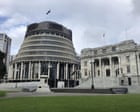
In the complex world of international happenings, three current stories showcase the multifaceted challenges and considerations societies navigate today. From electoral reforms in New Zealand to workers’ compensation debates in Australia, and a tragic airplane crash affecting families worldwide, each narrative holds its unique place in the global tapestry.
In New Zealand, a significant debate surrounding electoral reform has sparked considerable attention. The Prime Minister, Christopher Luxon, has put forward a plan intended to update the nation’s electoral laws, which he describes as “outdated and unsustainable.” The proposed changes include closing voter enrollment 13 days before elections, reinstating a complete ban on prisoner voting, and prohibiting the distribution of free food, drink, or entertainment within 100 meters of voting stations. However, the country’s Attorney General, Judith Collins, has raised concerns, warning that the reforms might breach human rights legislation and potentially disenfranchise over 100,000 Māori voters. Despite these warnings, the government stands firm in its resolve, underscoring the tension between modernization efforts and protecting individual rights within electoral processes.
Meanwhile, in Australia, the Minns Labor government faces resistance in its bid to reform the workers’ compensation system in New South Wales. The proposed changes seek to raise the threshold for psychological injury claims and limit lifetime payments, aiming to streamline the compensation process. Critics, including educators and unions, argue that the bill fails to address deeper systemic issues underpinning workers’ compensation claims. The situation is underscored by instances such as one insurer spending $85,000 of public funds to contest a $5,000 knee surgery claim, highlighting the tension and dissatisfaction within the system. This ongoing debate encapsulates the broader struggle to balance cost efficiency with fair and humane treatment of workers.
Adding a somber note to the mix is the tragic mishap involving the family of a British victim of the Air India crash. Following an unfortunate accident, where Air India’s London-bound Boeing 787 Dreamliner crashed shortly after takeoff from Ahmedabad, the mother of a British victim found herself “heartbroken” due to a mistaken exchange of her son’s remains. The crash, which claimed the lives of 241 individuals, continues to impact the families involved, illustrating the profound human cost behind such disasters. The incident serves as a stark reminder of how logistical errors can exacerbate the grief experienced by those who lose loved ones in sudden tragedies.
Each of these stories provides a window into the challenges our global community faces: the balancing act of electoral reform with human rights, the complexities of ensuring fair workers’ compensation systems, and the deep emotional toll of international tragedies. These narratives call for careful contemplation and action from authorities and individuals alike to foster a more just and considerate world.
Source: {link}
